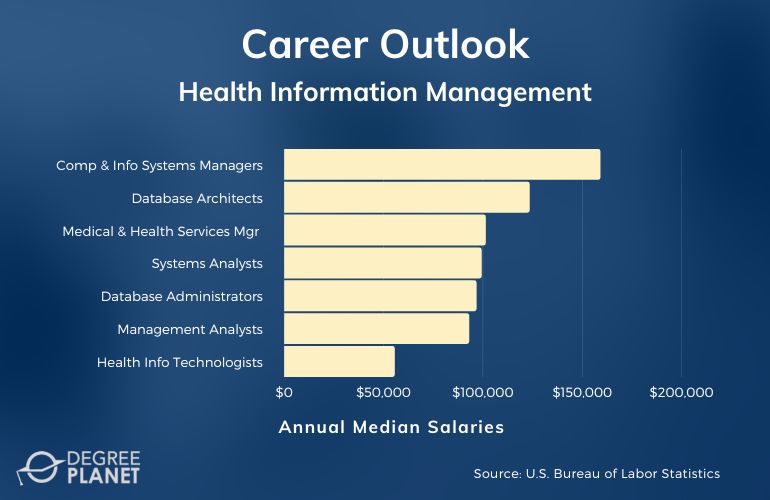With a health information management degree, you can prepare to help healthcare organizations manage their data and technology needs. That’s an in-demand skill set with the potential to improve people’s care as well as medical practices’ business operations.

In a health information program, you’ll study healthcare topics and technology concepts—and how those two disciplines work together.
Editorial Listing ShortCode:
You have the opportunity to develop a specialized skill set that’s relevant to the needs of today’s healthcare organizations.
Online Health Information Management Degrees

If you’re interested in a behind-the-scenes job that helps healthcare organizations run efficiently, then health information management might be the field for you. While you won’t deliver clinical services directly to patients, you can contribute to their overall healthcare experience.
Health information management deals with the data of healthcare. Through effective data management, healthcare providers can keep apprised of patients’ needs, track reimbursements, identify trends, reduce costs, and improve the quality of care. Not all jobs in health information require a college degree. Advancing to leadership roles usually does, though.
Whether you’re just getting started or want to take your career to the next level, earning a bachelors in health information management may help you qualify for senior or leadership roles in the field.
During your studies, you’ll likely learn about:
- Data analysis
- Databases
- Health insurance and reimbursement
- Management practices
- Medical coding
- Medical terms and systems
- Privacy laws
- Project management
- Research
These lessons are often delivered through online formats. Going to school online can help you balance your coursework and your other responsibilities. Schools often include an internship as part of this type of program.
Editorial Listing ShortCode:
You may partner with a local healthcare organization to put your new skills into practice, and you could gain real-world experience under the guidance of a current practitioner. The lessons you learn might transfer directly into the job you get after graduation. Professional certifications can also be critical for success in this field. A common example is the Certified Coding Specialist (CCS) credential.
If you’ve been working in health information for a while and already hold a related credential, some colleges will grant you credit in exchange. That could help you complete a degree program more quickly. Earning a health information management degree may also help you qualify for additional credentials. For example, after graduation, you could be on the road to becoming a Registered Health Information Administrator (RHIA).
Health information professionals with industry certifications may work in hospitals, health departments, insurance companies, or other organizations. Potential job titles include health information technologist, IT project manager, or medical services manager.
HIM Careers & Salaries

If you’re interested in a career in healthcare information management, you might start in an entry-level role. Your responsibilities could be related to reception, scheduling, or billing. Entry-level job titles include medical secretary or administrative medical assistant. Those positions would give you experience with healthcare terminology and practices.
With some specialized training, you might move into a role that focuses more on healthcare information. Examples include being a medical coder or an information technician. Employers often want applicants for those jobs to hold industry certification. A health information management bachelors degree could help you prepare for the certification exams.
Jobs for people in the HIM field can be found in hospitals, doctor’s offices, insurance companies, nursing homes, and healthcare-related government agencies. Another option is to work for companies that make healthcare software.
According to the Bureau of Labor Statistics, healthcare-related jobs are expected to grow by 16% over the next ten years.
| Careers | Annual Median Salaries |
| Computer and Information Systems Managers | $159,010 |
| Database Architects | $123,430 |
| Medical and Health Services Managers | $101,340 |
| Systems Analysts | $99,270 |
| Database Administrators | $96,710 |
| Management Analysts | $93,000 |
| Health Information Technologists and Medical Registrars | $55,560 |
| Medical Records Specialists | $46,660 |
| Medical Secretaries and Administrative Assistants | $37,450 |
| Medical Assistants | $37,190 |
You may start your professional journey by gaining experience in the healthcare field through entry-level roles and then advancing your way toward a management position.
A bachelors degree may qualify you for other jobs in this industry as well. Your knowledge of information systems could be useful for technology jobs. For example, you could work on networks or databases for a healthcare organization.
Editorial Listing ShortCode:
Systems analysts can also help healthcare businesses find and implement the best technology for their needs. IT project managers fall into that job category. Data analysis is another skill you might develop in your studies. Being able to organize and evaluate data could help you prepare for work as a management analyst for healthcare organizations.
Eventually, you might qualify for a management role in a healthcare company. Depending on their previous experience, some professionals work as medical services managers, clinical data managers, or information systems managers.
Health Information Management BS Curriculum & Courses

To earn a bachelor’s in health information management online degree, you will take enough courses to earn at least 120 college credits.
Common classes include:
- Databases: You can learn how to construct databases that are useful for recording and analyzing data in healthcare settings.
- Ethical Health Information Management: You’ll discuss the laws and ethical issues surrounding the collection and use of healthcare data.
- Information Technology: You’ll have a class that surveys information technology concepts and the role of IT in healthcare systems.
- Management Principles for Health Information: There may be a class that equips you with managerial skills for heading up health information departments.
- Medical Coding: You’ll learn about the various coding systems and become familiar with the classification rules they use.
- Medical Terminology: This class helps you become familiar with the words, phrases, and abbreviations that are used when talking about healthcare.
- Privacy and Security: This class will look at what it takes to ensure that patients’ sensitive medical data is handled properly.
- Reimbursement: You’ll learn about how healthcare is paid for in the US, and you’ll study the regulations surrounding reimbursement.
- Research in Health Information: A research class will cover the principles that guide studies and data analysis in this field.
- US Healthcare Delivery: This course will examine the systems used for public and private healthcare delivery in the United States.
Some programs place a greater emphasis on the information technology aspects of this field, and others focus more on the healthcare concepts involved. You may want to compare curricula as you think about where to enroll.
Admissions Requirements

Many online health information management programs have simple admission requirements, such as:
- Application form
- Fee to cover processing costs
- Proof of high school graduation or a GED
- Transcripts from high school and any college classes you’ve completed
ACT or SAT scores are no longer required at all schools, so you may not need to submit those, depending on your school. Other requirements you might be asked to submit include reference letters, an essay, and a resume.
BS in Health Information Management Programs Accreditation

If you’re interested in an HIM career, you can start by earning a degree at a regionally accredited college or university. By selecting a regionally accredited school for your studies, you can count on receiving a quality education.
Regional accreditation is important when it comes to having your studies recognized by other schools. Your coursework has a higher chance of being transferrable, and your degree may help you qualify for a graduate program.
Editorial Listing ShortCode:
Employers often appreciate regional accreditation too. In fact, an education from an accredited school may be a requirement for securing professional certification.
CAHIIM Accreditation
Another type of accreditation to pay attention to is programmatic accreditation. Regional accreditation applies to an entire university, while programmatic accreditation is specific to the academic programs in a certain field.
When it comes to health information management programs, you can look for accreditation granted by the Commission on Accreditation for Health Informatics and Information Management Education (CAHIIM). That way, you can trust that your studies will meet current industry standards. In fact, a CAHIIM accredited degree is a common requirement for Registered Health Information Administrator (RHIA) certification.
Health Information Management Licensure and Certifications

The American Health Information Management Association (AHIMA) offers credentials in this field. Registered Health Information Technician (RHIT) is a certification for those who work in medical coding, patient data, and health records. An accredited associate degree in the field is a prerequisite.
For professionals with qualifying bachelors degrees, AHIMA’s Registered Health Information Administrator (RHIA) credential might be a more strategic choice. RHIAs do similar jobs to RHITs, but they are also administrators or managers. They can have greater responsibilities, such as making more decisions. Other credentials in this field include Certified Coding Specialist (CCS) and Certified Health Data Analyst (CHDA).
Financial Aid and Scholarships

You may be able to get financial assistance to help you pay for college. Your household income may qualify you for government financial aid, which often comes in the form of grants or loans. Grant money is a gift that doesn’t need to be repaid. Student loans are money that you borrow and repay with interest after college.
To learn about your government aid eligibility, you can fill out the Free Application for Federal Student Aid (FAFSA). Other financial gifts can help as well. Institutional scholarships are tuition discounts that your school provides to qualifying students. Some students receive private scholarships as well. In addition, you can see whether your employer will contribute to the cost of your education.
What Is a Health Information Management Bachelor Degree?

A health information management (HIM) bachelor degree is designed for people who want to learn about data and records management for healthcare settings. It has the potential to prepare you for entry-level roles, mid-level roles, or management roles.
During HIM studies, you will take classes on the healthcare system and medical terminology. In addition, you can study databases and other information technology topics. Other courses may address privacy laws, management principles, and healthcare ethics.
Can I Earn a HIM Degree Online?
Yes, a degree in health information management can be earned online. In fact, you may earn not only a bachelors degree online, but a masters in health informatics online and even a PhD in Health Informatics online as well.
Many accredited colleges offer distance learning programs for this area of study. The reading assignments, lectures, tests, and papers can all be done in virtual classrooms. You may be able to complete all of your academic requirements without ever stepping foot on campus.
Some colleges do require that you earn practicum hours before graduation, but you may be able to find a local site for that. Your school might also be able to help you identify a suitable healthcare organization in your area.
Is Health Information Management a Good Career Choice?

Yes, health information management is a good career choice for many professionals. It can give you the opportunity to make a difference in people’s wellbeing. For those who are interested in the healthcare field but not in clinical care, a job in health information could be a great fit.
Editorial Listing ShortCode:
Working in this field could put you on track for a management position someday. According to the Bureau of Labor Statistics, medical and health services managers usually earn between $60,780 and $205,620 annually. The median salary for computer and information systems managers is $159,010, but top earners make more than $208,000 each year (Bureau of Labor Statistics).
What Can I Do with a Health Information Management Degree?

Professionals in health information often work as records technicians, registrars, medical coders, or administrative assistants. According to the Bureau of Labor Statistics, those jobs may require specialized training but don’t always depend on a degree.
Earning an HIM degree could expand your career opportunities. For example, some graduates become database administrators for healthcare organizations. Working as a systems analyst might be another option. If you’re interested in a management role, potential positions include IT project manager, health services manager, or information systems manager.
What Does a Health Information Manager Do?

Health-related organizations collect and use data to improve the care patients receive and to streamline their operating costs. Health information managers are professionals who handle those responsibilities. People who work in this field have information technology skills. They can make their way around a database and do some network administration.
Health information managers also understand the healthcare world. They know medical terminology and how to code procedures, and they understand reimbursement and healthcare laws. They may handle responsibilities like organizing files, overseeing software upgrades, building databases, registering patients, sending bills, or troubleshooting technology problems.
Is an Online Degree in Health Information Management Hard?
If you study health information management, it’s necessary for you to become familiar with medical terminology. You’ll also take classes on medical coding and learn the various classification systems.
Working in HIM also means working with technology. If this is a career that you’re interested in, then it’s helpful to be comfortable using a computer and exploring how its systems work. During your program, you may have lab classes in which you’ll practice using databases.
There’s often a practicum requirement built into information management programs as well. To succeed with that, it’s beneficial to be open to learning new things from a mentor and receiving correction.
How Long Does It Take to Get a Bachelor’s Degree in Health Information Management Online?

If you’re a full-time student who takes classes throughout the year, you may be able to graduate with your bachelors in about 3 to 3.5 years.
Some people who earn HIM degrees online finish even more quickly. The key is to choose a self-paced program with 8 week terms that are offered throughout the year. If you’d prefer a more traditional approach to the college calendar, you’ll likely take classes that are arranged in 16 week semesters. A traditional bachelors program generally takes 4 years to complete with full-time study.
Editorial Listing ShortCode:
Transfer credits can help shorten your time in college, and getting credit for your professional experience or certifications can reduce your program length too.
What’s the Difference Between a Healthcare Administration vs. Health Information Management Bachelor’s Degree?
Healthcare administration and health information management are two different disciplines within the business of healthcare. The following chart shows how they compare.
| Healthcare Administration | Healthcare Information Management |
|
|
These programs often have several shared classes, and the career opportunities can overlap as well.
What’s the Difference Between a Bachelor Degree in Health Information Management vs. Health Informatics?
Both information management professionals and informatics professionals are involved with healthcare data, but the fields aren’t exactly the same. Here’s how they stack up.
| Health Informatics | Health Information Management |
|
|
Because these two fields do have a lot in common, some schools offer combined programs that teach both information management and informatics.
Is a Bachelor in Health Information Management Degree Worth It?

Yes, a bachelor in health information management degree is worth it for many professionals. In the US, the demand for health services is increasing. As a result, the need for administrative and management healthcare professionals is growing.
Editorial Listing ShortCode:
According to data from the Bureau of Labor Statistics, jobs for health information technologists are expected to grow at an 11% rate over the next ten years. Studying health information management can equip you with the critical technology skills that today’s healthcare employers are looking for.
Universities Offering Online Bachelors in Health Information Management Degree Program
Methodology: The following school list is in alphabetical order. To be included, a college or university must be regionally accredited and offer degree programs online or in a hybrid format.

American Public University offers an online program for a Bachelor of Science in Health Information Management. Courses cover key topics such as medical terminology, pharmacology classifications, compliance, and coding guidelines. This program requires the completion of 120 credits. Each course is 8 to 16 weeks long. Students may transfer in up to 90 approved credits from outside institutions.
APUS is accredited by the Higher Learning Commission.

CUNY School of Professional Studies offers a Bachelor of Science in Health Information Management. The curriculum incorporates fundamentals in data management, research and statistics, health services, information technology, and organizational management. This program is housed entirely online. On average, students can complete their required credits in 6 years or less.
The CUNY School of Professional Studies is accredited by the Middle States Commission on Higher Education.

The Bachelor of Science in Management program at Fisher College offers a concentration in Health Information Management. The curriculum requires the completion 131 credits, which can typically be finished in 10 terms, or 20 months, of full-time study. All courses are held online, and each one is 8 weeks long.
Fisher College is accredited by the New England Commission of Higher Education.

Grand Valley State University offers a Bachelor of Science in Health Information Management. This program may be an excellent fit for students pursuing administrative and information systems careers in healthcare. The program utilizes a fully online learning format. Courses cover topics like healthcare law, leadership, strategic planning, quality in healthcare, and coding.
Grand Valley is accredited by the Higher Learning Commission.

Indiana Tech offers a Bachelor of Science in Health Information Management. The program aims to provide students with core competencies in information management, data mining, compliance, and systems development. Students can attend their classes entirely online. Graduates often pursue careers as health data architects, data integrity analysts, informatics researchers, or quality improvement analysts.
Indiana Tech is accredited by the Higher Learning Commission.

Indiana University—Purdue University Indianapolis offers a Bachelor of Science in Health Information Management. The program seeks to provide students with the skills to affect positive changes in healthcare systems. The program is housed fully online. On average, students attending full-time can complete the program’s 120 required credits in 4 years.
Indiana University – Purdue University Indianapolis is accredited by the Higher Learning Commission.

Loma Linda University offers a Bachelor’s in Health Information Management. The curriculum aims to prepare students to navigate healthcare technologies, manage and analyze data, and keep all information compliant with relevant regulations. Classes cover topics such as healthcare ethics, privacy and security, health information science, and data analytics. Students can attend classes online or on-campus.
Loma Linda University is accredited by the Western Association of Schools and Colleges.

Northwestern College offers a Bachelor of Science in Health Information Management. Students interested in technological support roles in the healthcare field may find an ideal next step in this program. Students can typically complete their requirements in 4 years. All classes are held in a fully online format.
Northwestern College is accredited by the Higher Learning Commission.

Rasmussen University offers a 100% online program for a Bachelor’s in Health Information Management. The curriculum is centered on skill development in leadership, communication, and management. The program consists of 180 required credit hours. Graduates of the program often pursue roles as privacy officers, compliance auditors, clinical documentation specialists, or health information administrators.
Rasmussen University is accredited by the Higher Learning Commission.

Southern University at New Orleans offers a Bachelor of Science in Health Information Management Systems. The curriculum covers essential skills in data collection, storage, retrieval, and messaging in healthcare, social services, and insurance sectors. To graduate, students must complete 120 credit hours while maintaining a 2.0 GPA. The program is 100% online.
Southern University at New Orleans is accredited by the Southern Association of Colleges and Schools Commission on Colleges.

The School of Allied Health Sciences at Southwestern Oklahoma State University offers a Bachelor of Science in Health Information Management. The degree can be obtained in a convenient online format. The program aims to provide students with the skills to manage data and navigate information systems while providing excellent service and maintaining compliance.
SWOSU is accredited by the Higher Learning Commission.

SUNY Polytechnic Institute offers a Bachelor of Science in Health Information Management. This program is designed to prepare students entering the field of healthcare technology. Classes cover topics like clinical sciences, research methods, healthcare law, database management, and information technology services. Up to 75% of the program’s courses can be attended online.
SUNY Polytechnic Institute is accredited by the Middle States Commission on Higher Education.

Tacoma Community College offers a Bachelor of Applied Science in Health Information Management. The program’s fully online learning format is designed to provide flexibility for busy working professionals. The curriculum requires the completion of 180 credit hours. Potential courses include Health Data Structure and Quality, Information Protection, Analytics and Data Use, and Health Compliance.
TCC is accredited by the Northwest Commission on Colleges and Universities.

Tennessee State University offers an online program for a Bachelor’s in Health Information Management. The program seeks to teach students how to leverage technology to improve the function of healthcare organizations.
This interdisciplinary curriculum combines core concepts from medicine, information technology, management, finance, healthcare, and law. Most students can complete their degree in 4 years of full-time attendance.
Tennessee State University is accredited by the Southern Association of Colleges and Schools Commission on Colleges.

The College of St. Scholastica offers a Bachelor of Science in Health informatics and Information Management. The program may be an ideal fit for students who want to pursue careers in healthcare. Students may choose between fully in-person or online class experiences. Regardless of learning format, students are given opportunities to gain hands-on training through required field experiences.
The College of St. Scholastica is accredited by the Higher Learning Commission.

The University of Kansas offers an online program for a Bachelor in Health Information Technology. The program is intended to prepare graduates for earning their credentials as registered health information administrators. On average, students can complete their studies in 4 years of full-time attendance. Students may be able to gain credit for previous academic or professional experience relevant to the discipline.
The University of Kansas is accredited by the Higher Learning Commission.

The University of Mississippi offers a Bachelor of Science in Health Informatics and Information Management. The curriculum is designed to provide students with the knowledge and skills to successfully manage data within the field of healthcare. After the completion of general baccalaureate education requirements, students must complete 60 major-specific credits. All classes are delivered online.
The University of Mississippi is accredited by the Southern Association of Colleges and Schools Commission on Colleges.

The Bachelor of Arts in Information Management and Systems program at the University of South Carolina—Upstate offers a concentration in Health Information Management. This concentration is intended to familiarize students with best practices and compliance standards for data management in healthcare. Classes combine important concepts from business, technology, management, and communication disciplines.
The University of South Carolina Upstate is accredited by the Southern Association of Colleges and Schools Commission on Colleges.

The University of the Potomac offers a Bachelor’s in Health Information Management. The curriculum covers topics like health records, compliance, healthcare law, and medical terminology. The program may permit students to transfer in up to 84 of their 120 required credits from outside institutions. Students can attend classes at one of two campuses or online.
The University of the Potomac is accredited by the Middle States Commission on Higher Education.

The University of Wisconsin—Stevens Point offers a Bachelor of Science in Health Information Management and Technology. This degree is intended for students who have already completed an associate degree or previous college credits. Students can attend classes entirely online. Graduates often pursue careers as health data analysts, compliance coordinators, privacy officers, or health data statisticians.
UW-Stevens Point is accredited by the Higher Learning Commission.
Getting Your Bachelors in Health Information Management Degree Online

Healthcare organizations rely on the work of health information management professionals. They can collect, organize, and work with the vast amounts of data collected in healthcare settings. That data is useful in caring for patients, making management decisions, and uncovering health trends.
To make your mark in this important field, you might consider earning your bachelor’s degree in health information management. You’ll study quality improvement, information technology, healthcare reimbursement, procedure classification, data privacy, and more.
This online healthcare management degree can be earned from an accredited university. You can take a look at accredited online health information management programs and start planning your future today.

